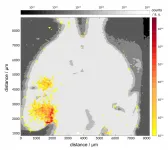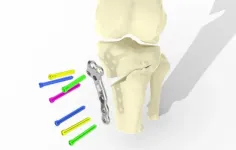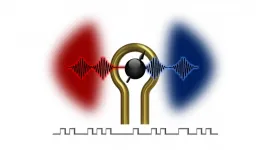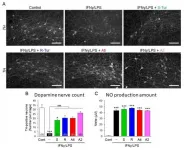Metal-based molecules show promise against the build-up of Alzheimer's peptides
2021-07-14
(Press-News.org) In lab tests, Imperial researchers have created a metal-based molecule that inhibits the build-up of a peptide associated with Alzheimer's disease.
A peptide is a fragment of a protein, and one of the key hallmarks of Alzheimer's disease is the build-up of a specific peptide known as amyloid-β. The team demonstrated that with the aid of ultrasound, their molecule can cross the blood-brain barrier in mice, targeting the part of the brain where the damaging peptide most often accumulates.
Alzheimer's disease is the most common form of dementia, affecting approximately 50 million people worldwide. There is a pressing need to develop drugs that can prevent or reverse the effects of this devastating disease.
Some metal-based molecules have been previously designed to prevent amyloid-β from building up. However, these are often toxic to cells, or are unable to cross the blood-brain barrier (BBB) - a semi-permeable protective barrier that carefully regulates the passage of substances that enter and exit the brain.
Now, a team from the Departments of Chemistry and Bioengineering at Imperial College London have designed a metal-based molecule that is highly effective at preventing the build-up of amyloid-β in lab-based studies.
They also showed that the molecule is non-toxic to human brain-like cells, and that it can cross the blood-brain barrier in mice with the help of a technique using microbubbles and focused ultrasound. The results are reported in the journal Chemical Science.
First author Tiffany Chan, from the Departments of Chemistry and Bioengineering at Imperial, said: "Very few metal-based molecules have been investigated as potential inhibitors of amyloid-β build-up because of toxicity issues and difficulty crossing the blood brain barrier. The molecule we have designed is able to interfere with amyloid-β and seems non-toxic, and it can be delivered across the blood brain barrier using ultrasound, which means you don't need an invasive procedure."
The molecule is centred around the metal cobalt, surrounded by organic molecules that form a complex, which binds to amyloid-β peptides, preventing them from binding to each other and building up. The molecule also incorporates chemical groups that prevent it from being taken up into human nerve cells, reducing its toxicity.
To demonstrate the molecule could cross the BBB, the team used a technique that involves injecting the molecule alongside microbubbles into the veins of mice. When ultrasound is directed at the brain, the microbubbles rapidly move back and forth, opening the BBB and allowing the molecule to enter the brain in a non-invasive and targeted manner.
The team were able to focus the ultrasound on the hippocampal region of the brain, which is often strongly impacted by the build-up of amyloid-β in the early stages of Alzheimer's disease. They were also able to show how specific the ultrasound targeting can be by delivering the molecule only to the left hippocampus.
The molecule was shown to be well tolerated by the mice, who showed no ill effects after several weeks. Co-author Professor Ramon Vilar, from the Department of Chemistry at Imperial, said: "This study shows the potential that metal-based molecules have in preventing amyloid-β aggregation. The new compound will be studied in more depth to establish whether it can also prevent amyloid-β build-up in mice without having unwanted toxic side effects."
INFORMATION:
[Attachments] See images for this press release:

ELSE PRESS RELEASES FROM THIS DATE:
2021-07-14
Pioneering 'printed metal' procedure to create bespoke treatment for early knee osteoarthritis set to be trialled in the UK following MHRA approval.
World's first 3D printed high tibial osteotomy (HTO) device and procedure developed at University of Bath given approval for UK trials
Bespoke titanium alloy HTO implants that fit perfectly are designed to reduce discomfort for knee osteoarthritis patients
Sophisticated 3D scanning aims to make surgery quicker and safer
New TOKA process could make earlier intervention possible - saving patients decades of pain before surgery becomes viable
Intro
A ...
2021-07-14
Many of us swing through gates every day -- points of entry and exit to a space like a garden, park or subway. Electronics have gates too. These control the flow of information from one place to another by means of an electrical signal. Unlike a garden gate, these gates require control of their opening and closing many times faster than the blink of an eye.
Scientists at the U.S. Department of Energy's (DOE) Argonne National Laboratory and the University of Chicago's Pritzker School of Molecular Engineering have devised a unique means of achieving effective gate operation with a form of information processing called electromagnonics. Their pivotal discovery allows real-time control of information transfer between microwave photons and magnons. And it could result in a new generation ...
2021-07-14
An important new study by researchers at the U.S. Department of Energy's (DOE) Argonne National Laboratory has yielded critical fresh insights into the lithium production process and how it relates to long-term environmental sustainability, particularly in the area of transportation with batteries and electric vehicles.
The paper, "Energy, Greenhouse Gas, and Water Life Cycle Analysis of Lithium Carbonate and Lithium Hydroxide Monohydrate from Brine and Ore Resources and Their Use in Lithium Ion Battery Cathodes and Lithium Ion Batteries," in the journal ...
2021-07-14
Prof. PAN Jianwei and Prof. ZHANG Jun from University of Science of Technology of China (USTC) of the Chinese Academy of Sciences, collaborating with Prof. CHU Tao's group from Zhejiang University, realized the fastest and miniaturized real-time quantum random number generator (QRNG) with the record-breaking output rate of 18.8 Gbps by combing a state-of-the-art photonic integrated chip with the optimized real-time post processing. The study was published in Applied Physics Letters on June 29.
Random number exists in many fields such as information security and cryptology industries. Different from other random number generators, QRNG, as the key part in quantum communication system, embraces the characteristics ...
2021-07-14
Prof. DU Jiangfeng, Prof. RONG Xing, and their colleagues from the Key Laboratory of Micromagnetic Resonance, University of Science and Technology of China (USTC) of the Chinese Academy of Sciences (CAS), set the most stringent laboratory constraint on the exotic spin- and velocity-dependent interaction at the micrometer scale. This study was published in Physical Review Letters.
The search for dark matter, dark energy, and extra forces is important for the understanding of the existence of the matter that accounts for about a quarter of the universe, but little progress has been made. It is necessary to theoretically and experimentally find particles outside the Standard Model, a tradition ...
2021-07-14
Shells of tamarind, a tropical fruit consumed worldwide, are discarded during food production. As they are bulky, tamarind shells take up a considerable amount of space in landfills where they are disposed as agricultural waste.
However, a team of international scientists led by Nanyang Technological University, Singapore (NTU Singapore) has found a way to deal with the problem. By processing the tamarind shells which are rich in carbon, the scientists converted the waste material into carbon nanosheets, which are a key component of supercapacitors - energy storage devices that are used in automobiles, buses, electric vehicles, trains, and elevators.
The study reflects ...
2021-07-14
Osaka, Japan - When things get too much, we're often advised to "take a load off," but when it comes to bone maintenance, doing the opposite can be a good thing. Researchers from Japan have discovered some key mechanisms of how physical load stimulates bone growth.
In a study published July 13, 2021 at 11 a.m. ET in Cell Reports, researchers from the National Cerebral and Cardiovascular Center Research Institute have revealed that the expression of the peptide osteocrin (OSTN) is influenced by load - decreasing when load is reduced, and increasing when it is added.
Bones and skeletal muscles are strengthened by the load associated with exercise, preventing bone and muscle atrophy, and maintaining bone and muscle strength is important for maintaining physical activity. ...
2021-07-14
Researchers from Kumamoto University, Japan have found that a component derived from turmeric essential oil, aromatic turmerone (ar-turmerone), and its derivatives act directly on dopaminergic nerves to create a neuroprotective effect on tissue cultures of a Parkinson's disease model. This appears to be due to enhanced cellular antioxidant potency from the activation of Nrf2. The researchers believe that the ar-turmerone derivatives identified in this study can be used as new therapeutic agents for Parkinson's disease.
Parkinson's disease is a neurodegenerative disease caused by the ...
2021-07-14
When it comes to the medicinal and therapeutic properties of Cannabis sativa, an unsolved mystery is whether there exists an "entourage effect," whereby the pain-relieving effects of the plant as a whole are greater than any of its individual parts. New research from the University of Arizona Health Sciences has found evidence that favors the entourage effect theory and positions Cannabis terpenes, the part of the plant that provides flavor and aroma, as a promising new target for pain therapies that would require lower doses and produce fewer side effects.
"A lot of people are taking cannabis and cannabinoids for pain," said lead researcher John Streicher, PhD, a member ...
2021-07-14
An associate professor of marketing at The University of Texas at Arlington says digital avatars can replace a sales force and customer service employees at a fraction of the cost.
In this context, avatars are typically computer-generated representations of people. UTA Associate Professor Fred Miao says they can fill the void in interactive assistance that a majority of shoppers says they want.
"An Accenture survey of online shoppers shows that 62% never completed their purchases because there was no real-time customer service or support. That Accenture survey also shows that 90% of those shoppers wanted some sort of interactive assistance during the shopping process," said Miao, faculty fellow of the John Merrill Endowed Professorship ...
LAST 30 PRESS RELEASES:
[Press-News.org] Metal-based molecules show promise against the build-up of Alzheimer's peptides







